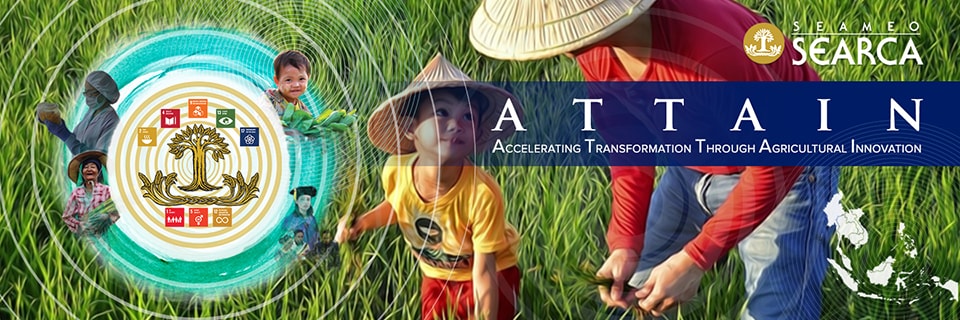
The Southeast Asian Regional Center for Graduate Study and Research in Agriculture (SEARCA) kicks off the implementation of its Eleventh Five-Year Plan (11FYP) on 1 July 2020. The new strategic plan sets out the principles and objectives that will guide SEARCA as it moves towards Accelerating Transformation Through Agricultural Innovation (ATTAIN).
"Our new development strategy was shaped by SEARCA's desire to contribute to the transformation of farmers who are stuck in the belief that farming is limited to production, into new farmers operating in a modern agriculture ecology, that is Agriculture 4.0," SEARCA Director Dr. Glenn B. Gregorio said.
For the next five years, SEARCA commits to accelerate transformation that elevates the quality of life of agricultural families through sustainable livelihoods and access to modern networks and innovative markets.
"Transformation efforts will focus on policy, institutional, social, and technological innovations," Dr. Gregorio explained.
He said the new SEARCA strategy focuses on the following priority areas: agri-business models for increased productivity and income, sustainable farming systems and natural resource management, food and nutrition security, transformational leadership for agricultural and rural development (ARD), gender and youth engagement in ARD, enhanced ARD towards climate resilience, and eco-health/one-health applications to ARD.
The new plan will be articulated through SEARCA's core programs on Education and Collective Learning (ECL), Research and Thought Leadership (RTL), and Emerging Innovation for Growth (EIG). ECL comprises graduate scholarship and institutional development and training for development. RTL leads research for development, policy and program advisory, and the agriculture, forestry, and natural resources knowledge platforms. EIG will provide farmers and farming families wider access to innovative products and services as well as business models for increased productivity and income through open innovation and agri-incubation; knowledge and technology transfer; and project development, monitoring, and evaluation.
SEARCA's development agenda aligns with the Sustainable Development Goals (SDGs) that address global challenges to achieve a better and more sustainable future for all.
Dr. Gregorio said SEARCA will contribute and allocate resources toward the achievement of SDG 2: Zero Hunger; SDG 4: Quality Education; SDG 9: Industry, Innovation, and Infrastructure; SDG 13: Climate Action; and SDG 17: Partnerships. He explained that these SDGs directly align with SEARCA's mandate and focus with greater emphasis on partnerships. He added that as SEARCA tries to achieve these five SDGs, it also touches SDG 1: No Poverty; SDG 2: Gender Equality; and SDG 12: Responsible Consumption and Production.
The new SEARCA development strategy was shaped following comprehensive consultations with the Center's partners, alumni, staff, and external stakeholders.
Dr. Gregorio said, "SEARCA governance shall engender bring about greater participation among the member countries and will pursue gender balance and inclusion of the younger generations in order to draw on from a more diverse pool of culture and ideas toward meaningful teamwork in pursuit of its mission."